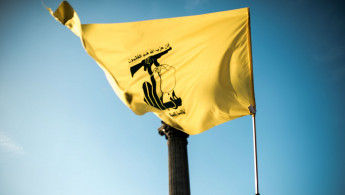Germany's ban on Hezbollah: A double-edged sword
Since the 1990s, the US and Israel have tried to persuade European Union states to classify Hezbollah as a terrorist group and ban it completely. By 2019, however, only the Netherlands and the United Kingdom had done so.
All other EU states classified only the military branch of Hezbollah as a terrorist organisation until December 2019, which meant that Hezbollah had a financial and logistical retreat right on its doorstep, not only in Germany.
The main argument against the ban has always been that it was intended to keep a dialogue open with the political branch of Hezbollah, which formed parts of the Lebanese government, both then and now.
Not least in German government circles, the hope was that this would lead to a moderation of the 'Party of God', and also preserve Germany's status as a mediator in the conflict between Israel and Lebanon.
Since Germany has no colonial or interventionist past in the Middle East, German foreign policy and its unofficial channels are often predestined for such a role.
 |
Since the 1990s, the US and Israel have tried to persuade European Union states to classify Hezbollah as a terrorist group |  |
However, this position changed, at least to some extent, on 30 April. The Ministry of Interior implemented a resolution in the Bundestag from December 2019 and banned the financial activities of the entire Hezbollah movement, including the founding of associations and any display of the symbols of the group in Germany.
At the same time, several clubhouses and apartments with links to Hezbollah were searched in Bremen, Berlin, Münster and Dortmund.
But where does this change of heart in the German approach come from? The reasons for the ban are manifold. According to official statements, the agenda of Hezbollah in Germany contradicts the "idea of international understanding", and Germany in particular has a "historical responsibility" in this respect, as the Minister of the Interior Horst Seehofer announced.
Activities organised by Hezbollah deemed as 'anti-Israel' in Germany, such as Quds Day on 16 May, were also a focal point.
In terms of domestic policy, however, Hezbollah's involvement with the Lebanese clans in Germany most probably also contributed to the ban, as the German judiciary has been taking tougher action against them for about two years now, pursuing a policy of zero tolerance.
 |
|
| Read more: Foreign hands in Syria's war creating new problems for Assad |
Against this background, the positive reactions to the ban came primarily from most democratic parties in Germany, but also from Jewish and Israeli institutions in Germany and abroad, which have long been calling for a ban of the entire organisation.
The US ambassador in Berlin, Richard Grenell, also felt vindicated. Unusually for an ambassador, he had already spoken out several times in favour of a ban in the German media, thus interfering in Germany's internal affairs.
A long-term setback for Hezbollah?
Although the Hezbollah network in Germany had more than four months to prepare for the ban, it was probably a hard blow for the group. After all, Germany in particular, along with France, was the hub of economic activity in Europe.
Its comparatively mild legislation made it ideal for money laundering, and the collection of donations and the recruitment of new recruits continued to take place in the country.
For example, money from the raw materials and drug trade in Latin America and Africa was brought to Germany via middlemen, where it was laundered through a large number of associations and smaller companies.
Even though the German Federal Office for the Protection of the Constitution estimates the number of Hezbollah supporters in Germany to number no more than around 1,000 activists, they had very good relations with the other Lebanese clan groups, which are involved in various illegal businesses, especially in Berlin, Essen, Bremen and Hanover.
As a result of the ban, Hezbollah is likely to have lost an important economic pillar in Europe. The ban of the most important Hezbollah fundraising association in Germany in 2014 already caused a setback in financial activities, as donations of almost one million euros per year were now lost. Especially in the precarious economic situation in Lebanon, foreign exchange is valuable and indispensable for strengthening one's own power.
 |
Even if the ban on Hezbollah is understandable for Germany in terms of domestic policy, the decision sends a problematic signal to some actors in the Middle East in terms of foreign policy |  |
It is therefore to be expected that the leadership under Hassan Nasrallah will establish new structures bypassing Germany and shift its focus of financial activities to France and Eastern Europe. Since France in particular, with its historical relations to Lebanon, does not want to risk a weakening of bilateral relations, a ban on the organisation in France is currently unlikely.
It is also questionable whether the German decision will find followers in the remaining EU states, as many have so far been satisfied with just the ban on Hezbollah's military wing.
In the long term, therefore, the ban will have fewer consequences than initially assumed. Nevertheless, Hezbollah faces greater challenges in the short term, which will be exacerbated by the Covid-19 pandemic and the economic crisis in Lebanon.
Understandable in domestic policy, problematic in foreign policy
Even if the ban on Hezbollah is understandable for the Federal Republic of Germany in terms of domestic policy, the decision sends a problematic signal for some actors in the Middle East in terms of foreign policy.
 |
|
| Read more: 'We will rise again': Lebanon's revolution is on hold but far from over |
Iran, which Hezbollah is known to be close to, condemned the decision, especially in the circles of the Revolutionary Guards. Lebanon also reacted in the same way, summoning the German ambassador Georg Birgelen on 5 May to make clear that Hezbollah "represents a main political component in Lebanon".
Against the backdrop of current developments in the region, where Iran is coming under increasing pressure and Hezbollah is bound by the situation in Beirut, Tripoli and other cities in the country as well as in Syria, the timing of the ban seems to the actors concerned like a clear positioning of Germany on the opposing side.
Not least, the impression has been created that the German authorities have succumbed to pressure from Israel and the US.
The consequences for Germany's role as a mediator in the region are likely to be felt at the official political level in the medium term, especially in Iran, where the failure of the nuclear agreement has disappointed the European side anyway. At the level of the intelligence services and other unofficial channels, however, the ban is unlikely to have much impact.
The example of Hamas, which has been banned in Germany since 2003, has shown that cooperation can take place despite political reluctance. For example, the German Federal Intelligence Service still mediates in exchanges of prisoners between Hamas and the Israeli side.
However, if Germany continues to take measures against organisations close to Iran, it is in danger of losing its role as a neutral mediator between the regional counterparts, similar to the US, which would make a diplomatic solution of the conflicts on the ground more difficult.
Stefan Lukas is a lecturer at the Chair of International Relations at the University of Jena, and guest lecturer at the Military Academy of German Armed Forces in Hamburg.
His research focuses on the foreign and security policy of states in the Middle East.



